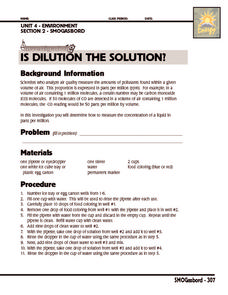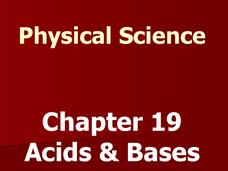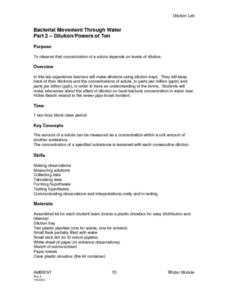Nuffield Foundation
Making Serial Dilutions
There's no need to water down the resource. A tutorial takes learners through the process of creating dilutions for any solution. Specifically, it focuses on serial dilutions with successive factors of 10.
Curated OER
Solutions
Amateur chemists define and describe properties of solutions, compare solubilities, explain how solutes affect freezing and boiling points, describe acid and base properties, and more! This educational PowerPoint provides information and...
Curated OER
Dilution and Concentration of Solutions
Future chemists practice laboratory techniques by creating a monochloramine solution. The objectives are to use of dilution, 9concentration, and measurement skills and to prepare a solution that will be used in a water treatment...
Chemistry Collective
Virtual Lab: Acid Dilution Problem
There's no risk of injury when working with virtual HCl! Challenge your young chemists with making calculations to create a 3M solution of HCl from the concentrated acid. They first calculate the correct ratios of HCl and water and then...
Chemistry Collective
Virtual Lab: Glucose Dilution Problem
There's no diluted learning here! Young chemists conduct a virtual lab exploration to practice their stoichiometry skills. By manipulating simulated solutions, they create a solution of a specific glucose molarity.
Chemistry Collective
Virtual Lab: Determination of the pH Scale by the Method of Successive Dilutions
Where did the pH scale come from? Take a deeper look at a most important measure of ion concentration using a simulated physical determination. Young chemists prepare a series of dilutions after determining a dilution factor for the...
Fuse School
QUIZ: Properties of Water and Dilution
What's the solution to gaining insight into your class' progress? Give this brief quiz a try! Part 10 of a 14-installment series on states of matter tests learners' skills in the areas of dilution and the properties of water, including...
Kenan Fellows
Solutions
Scientists require specific chemical solutions for their experiments. In the seventh and final installment in a series that integrates chemistry and algebra II, scholars learn to set up a system of equations to solve the volume of a...
Curated OER
# 14 Experimenting with Copper (II) Solutions
Students determine that the relative concentration of copper ions in water can be determined by a color comparison. They make a copper (II) sulfate solution of a given concentration. Students dilute their initial solutions until their...
Perkins School for the Blind
Mixtures and Solutions
Mixtures and solutions are different; one can be separated fairly easily and the other cannot. This hands-on experiment was written specifically for learners with visual impairments or blindness. They will use lemonade and trail mix to...
Texas State Energy Conservation Office
Investigation: Is Dilution the Solution?
Systematically diluting a full-strength sample of food coloring is meant to help earth scientists understand concentration in parts per million. While they will enjoy the lab exercise, it might be a challenge to help them relate it to...
Curated OER
Solutions
In this solutions worksheet, students answer 18 questions about solutions, saturation of solutions, solvents and solubility.
Curated OER
Reactions in Aqueous Solutions
In this solutions worksheet, students calculate the molarity and solubility for given reactions. Students work on dilution, precipitation, and titration reactions. This worksheet has 15 problems to solve.
Virginia Department of Education
Acids and Bases
What did one titration say to the other titration? We should meet at the end point! Young chemists perform four experiments: dilute solution, neutralization, titration, and figuring pH/pOH.
Curated OER
Aqueous Solutions
In this aqueous solutions worksheet, students will explore the characteristics of solutions, including the ability of different compounds to dissolve in the solutions. This worksheet has 10 true or false statements and 8 short answer...
Mr. E. Science
Acids, Bases and Solutions
If you are not part of the solution, then you are part of the precipitate. The presentation covers solutions, suspensions, solubility, dissociation, and acid/base reactions. This is the 19th lesson in a series of 26.
Curated OER
Is Dilution the Solution To Pollution?
Students demonstrate the meaning of dilution and concentration and how pollution can affect the water that you drink. They perform an experiment to calculate the final concentration and dilution factor of solutions. They record the color...
Curated OER
Serial Dilutions Made Easy
Learners improve their skills and comprehend the particular application for which serial dilutions are a tool. Serial dilutions are often used in microbiology, biotechnology, and in chemistry classes, to name just a few.
Curated OER
Additional Aqueous Solution Review Problems
In this solutions learning exercise, students balance chemical equations, classify reactions by the type of reaction it represents, and review the solubility rules. Students practice working out double displacement, neutralization, and...
Curated OER
Solutions, Suspensions, & Colloids Lab
In this solutions, suspension and colloid worksheet, learners complete a lab experiment in order to determine if a given mixture is a solution, suspension or colloid. They are given six vials and they record their observations of each...
Curated OER
Visual Models of Solutions and Concentrations
Students model solutions with beakers of colored glass or plastic spheres. In this solutions lesson, students use beakers of colored spheres to represent pure substances. They mix the spheres to demosntrate solutions. They discuss...
Nuffield Foundation
Making a Calibration Curve for Starch Concentration
How well can your class concentrate on solutions? Scholars use colorimeter absorption to explore a starch concentration calibration curve. They add iodine to different starch solutions to see how the concentration of the solution changes.
DiscoverE
Nanosolutions
There are a billion reasons to use the resource! Well, not quite. A demonstration using food color and water shows scholars the meaning of nano. An iterative process results in diluting the concentration of food coloring by one tenth...
Curated OER
Bacterial Movement Through Water Part 2- Dilution/Powers of Ten
Students make dilutions using dulution trays. They keep track of their dilutions and the concentrations of solute, to parts per million (ppm) and parts per billion (ppb), in order to have an comprehension of the terms. Students make...

























